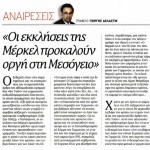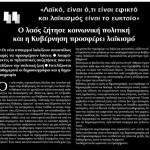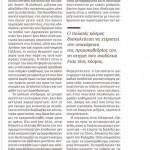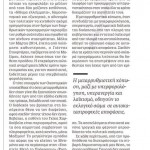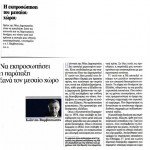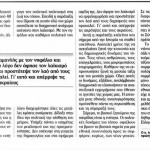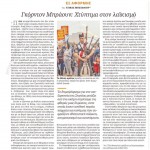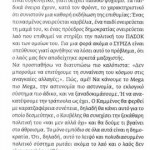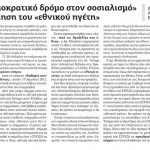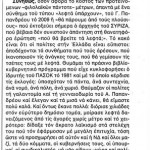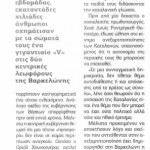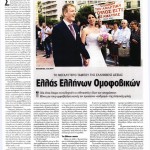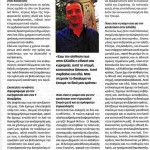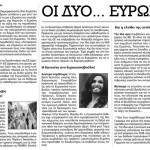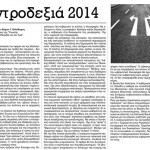Monthly Archives: September 2014
Abstract
Populism is usually studied by looking at the electoral and rhetorical strategies of parties considered to be populist. In contrast, this article attempts to measure the support for the core propositions of populism among voters and explain the social differences in that support. On the basis of a survey of the Dutch-speaking population of Belgium (N: 2,330) we find that this support for populism turns out not to be directly influenced by a weak or uncertain economic position, by dissatisfaction with personal life or feelings of anomie. Support for populism appears foremost as a consequence of a very negative view of the evolution of society – declinism – and of the feeling of belonging to a group of people that is unfairly treated by society.
Published in Government and Opposition (early view), DOI: http://dx.doi.org/10.1017/gov.2014.27, online: 30 September 2014, http://journals.cambridge.org/action/displayAbstract?fromPage=online&aid=9364377&fulltextType=RA&fileId=S0017257X1400027X
Abstract
Populist movements have become key players in European politics. These movements are readily criticized by journalists or political rivals, yet none of the common objections to populism seems to arrest their success. This article turns to normative political theory to cultivate sensitivity to problems arising from some existing arguments against populism, and to explore possible alternatives. It offers a critical reading of prototypical liberal and conservative arguments against populism, and proposes that the principles of solidarity and procedure provide good grounds for a sustainable critique of populism.
Published online before print September 24, 2014, doi: 10.1177/0191453714552211, in Philosophy Social Criticism, http://psc.sagepub.com/content/early/2014/09/23/0191453714552211.abstract
Abstract
Populist parties increasingly take a welfare chauvinistic position. They criticize mainstream parties for cutting and slashing welfare at the expense of the ‘native’ population and to the benefit of the ‘undeserving’ immigrant. Given the electoral success of populist parties, we investigate whether and when mainstream parties ignore, attack or accommodate welfare chauvinism. Using key theories of party behaviour, we test whether mainstream parties (1) respond immediately to populist parties, (2) respond with a time lag, or (3) respond only when they lose elections or are in opposition. Our quantitative analyses of party manifestos, speeches and policies of European mainstream and populist parties (1980–2012) show that mainstream parties adapt to populist parties on welfare chauvinism, but which parties adapt and when varies significantly. In our in-depth examinations of the Dutch and Danish cases, we highlight important cross-country and cross-party differences.
Published online before print September 22, 2014, doi: 10.1177/1354068814549345, in Party Politics, http://ppq.sagepub.com/content/early/2014/09/22/1354068814549345.abstract
Abstract
The purpose of this paper is to analyze the continuities or the “elective affinities” between the recent populist wave (or populist come back) in South America and the current Occupy Movement in order to trace the contours of an original populism at a global scale. The article starts with a brief definition of populism, continues with a brief evaluation of the recent return of populism in South America finishing with the analysis of the main connections with the current Occupy Movement: the experience of a crisis; the claims for more democracy and the exploration of a postneoliberal political economy. In societies with obscene levels of inequality such as what exists in many South American countries, populism does not seem to be a heresy or a pathology, but a rational alternative to solve problems rooted in a failed nation building processes. Increasing indignation as a generalize perception of non-experienced levels of inequality in the concentration of resources and power at the global level is at the basis of one can call a populist moment. It has to be discussed, if this populist moment also contains an original populist movement with global contours inside.
Chapter in Alexander Lenger & Florian Schumacher (Eds) Understanding the Dynamics of Global Inequality, Springer, 2015, pp. 199-211, http://link.springer.com/chapter/10.1007/978-3-662-44766-6_10
No abstract available.
Article first published online: 18 SEP 2014, DOI: 10.1111/1467-8675.12117, in Constellations, http://onlinelibrary.wiley.com/doi/10.1111/1467-8675.12117/abstract
Abstract
Many claim that populism in the Netherlands has grown over the last 10 years; that it spreads among mainstream parties; that its success has to do with the media, who pay more and more attention to populist parties and immigration issues; but that it is difficult to distinguish between political populism intended for the media and populism by the media. In a longitudinal content analysis of newspapers, television news, talk shows and party political broadcasts, covering seven elections in nearly 20 years, these claims are put to the test. The picture that emerges is far more ambiguous than publicized opinion suggests, with no clear trend but a downward one in 2012.
Published online before print September 15, 2014, doi: 10.1177/0267323114545709, in European Journal of Communication, http://ejc.sagepub.com/content/early/2014/09/12/0267323114545709.abstract
Abstract
Populism is a style of political discourse and practice that calls for the return of power to the people. The term populism derives from the Latin populus, referring both to a people, as in a political community, and to the common people, as in the masses. The populist tradition thus recalls the popular assemblies of ancient Athens and the plebeian councils of the Roman Republic. In modern politics, populism draws its force from the ideal of popular sovereignty, which holds that citizens are the fundamental source of power and authority in a legitimate political order. Populist actors and leaders claim to embody or represent the voice of the sovereign people, often dramatizing a conflict that pits the common people against elite concentrations of economic, cultural, or governmental power. Because it promises to return power to the people, and exposes fault lines in established orders, populism raises ongoing questions about the meanings, limits, and prospects of democracy.
Published in The Encyclopedia of Political Thought, Online: 15 SEP 2014, DOI: 10.1002/9781118474396.wbept0808, John Wiley & Sons, http://onlinelibrary.wiley.com/doi/10.1002/9781118474396.wbept0808/abstract




